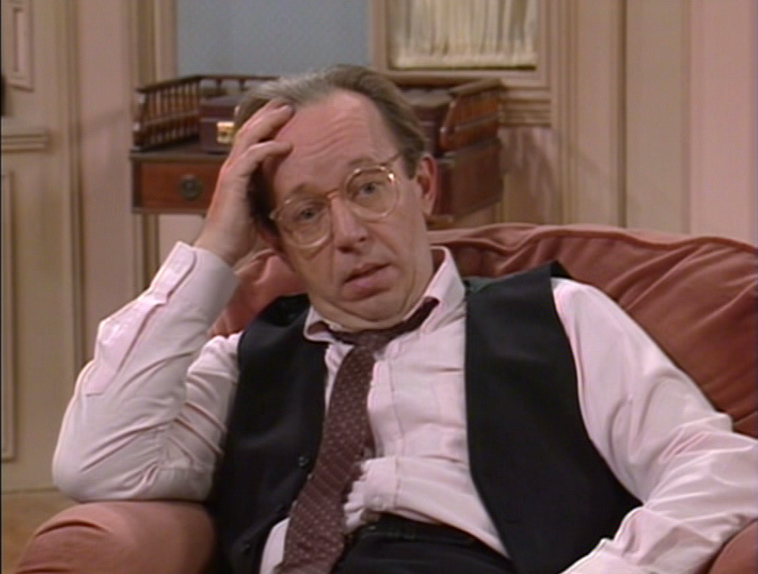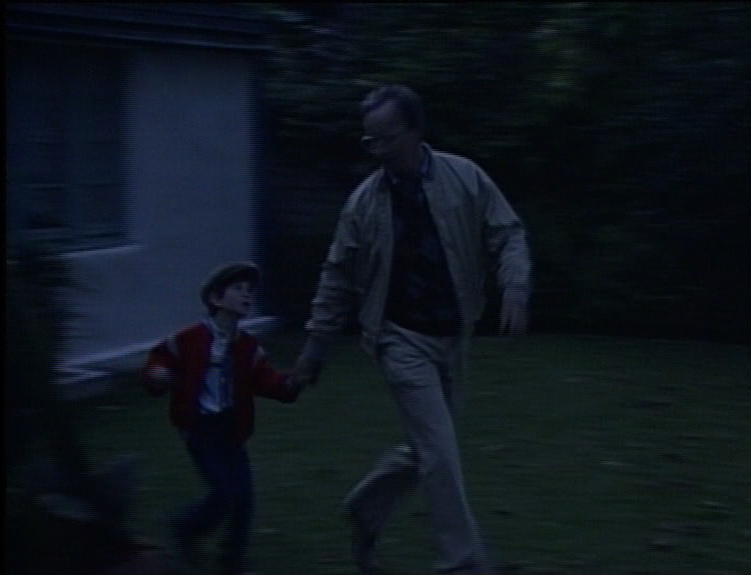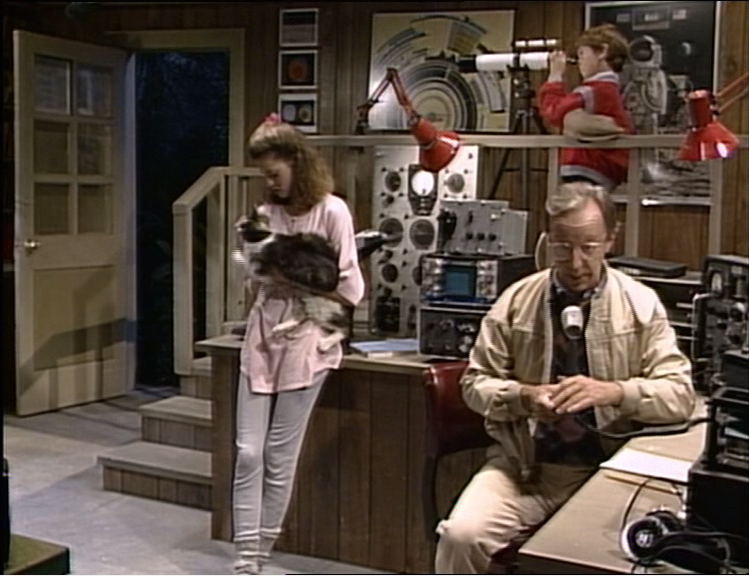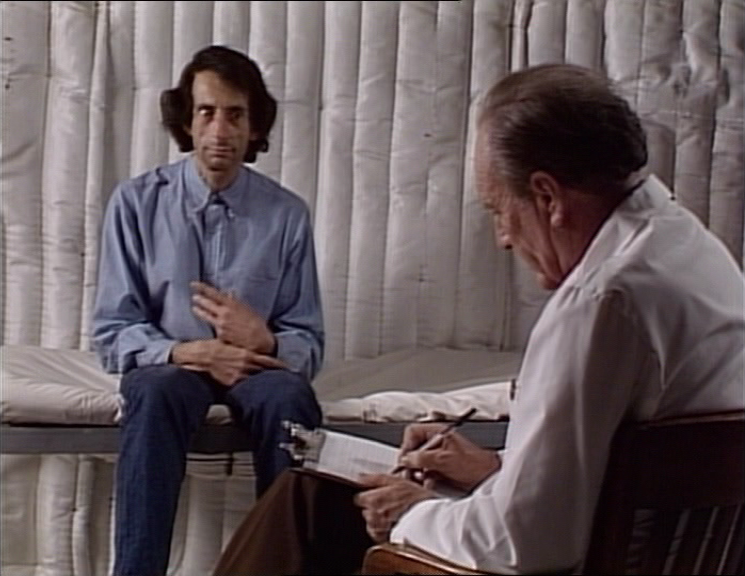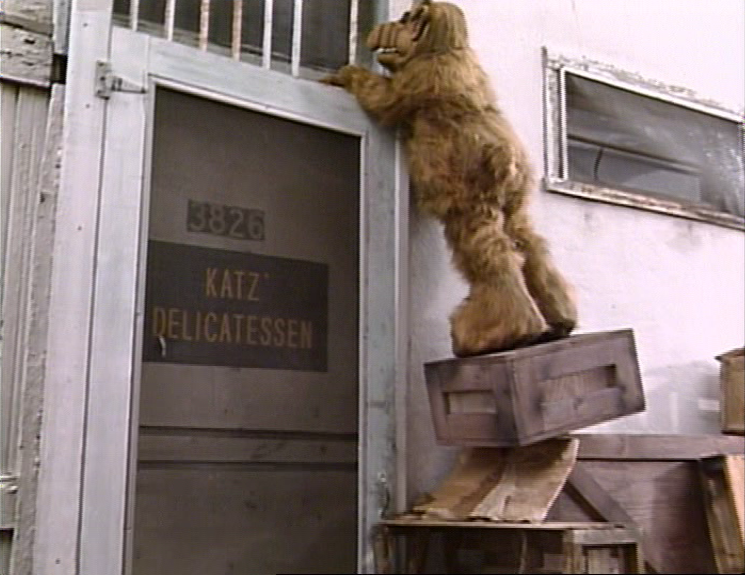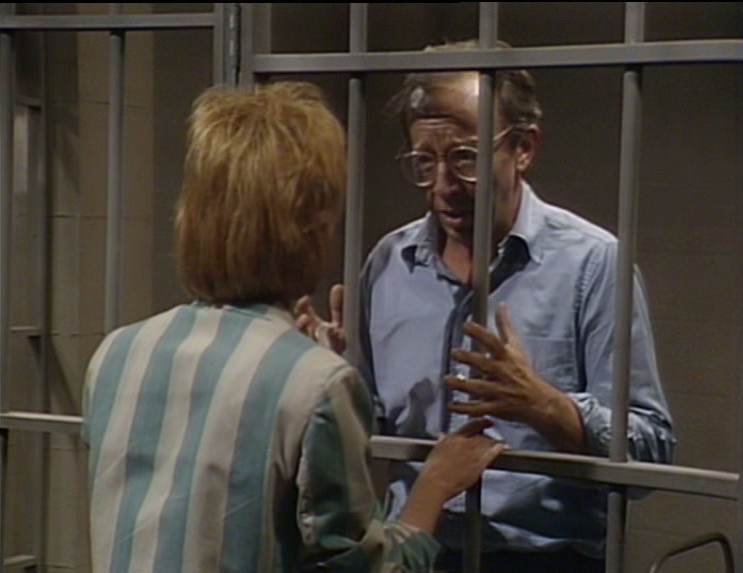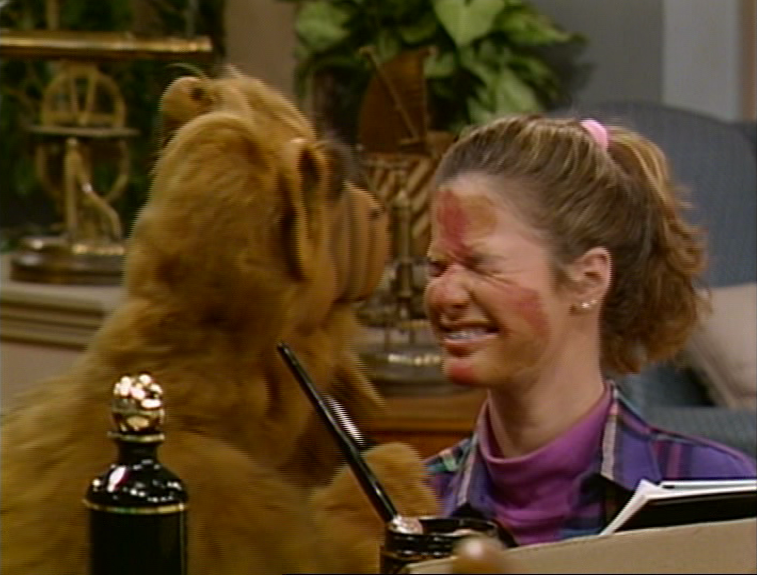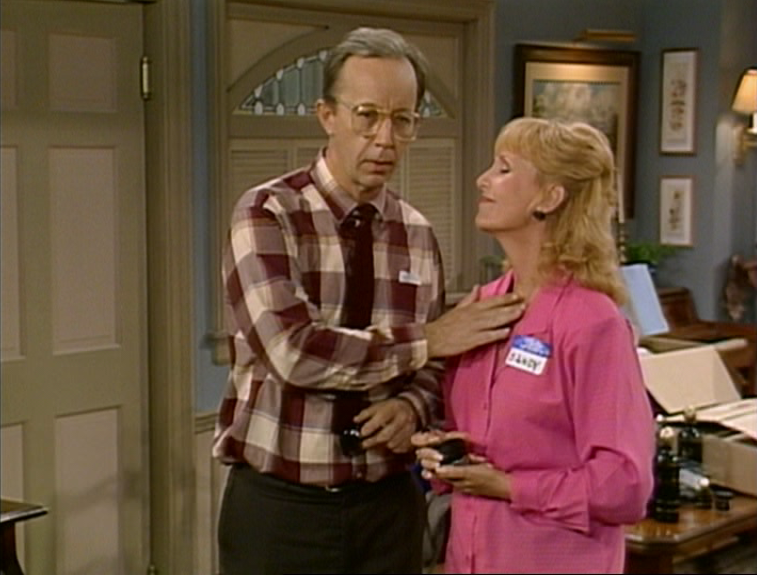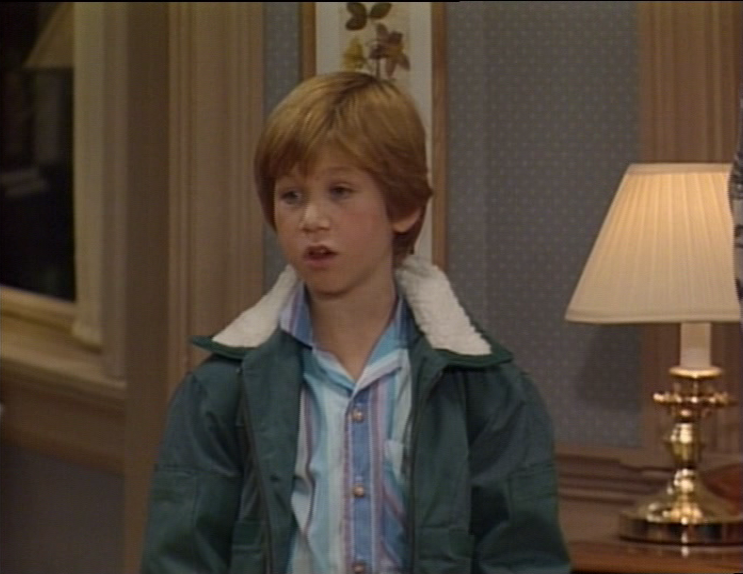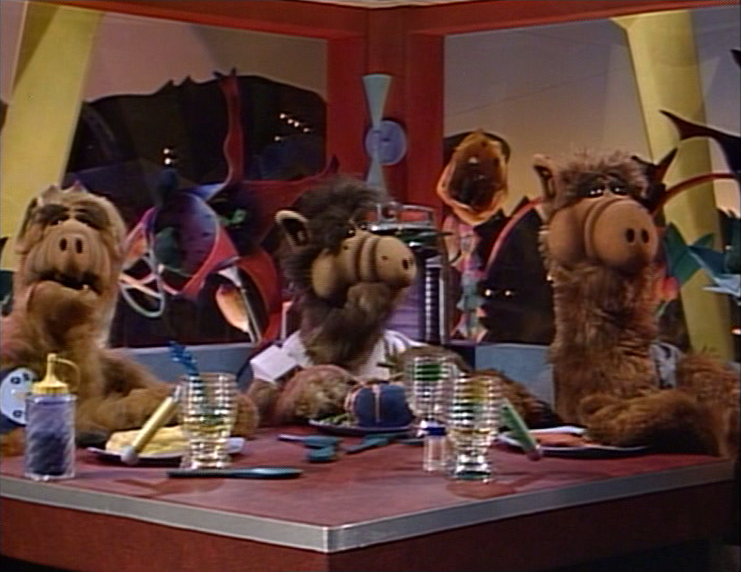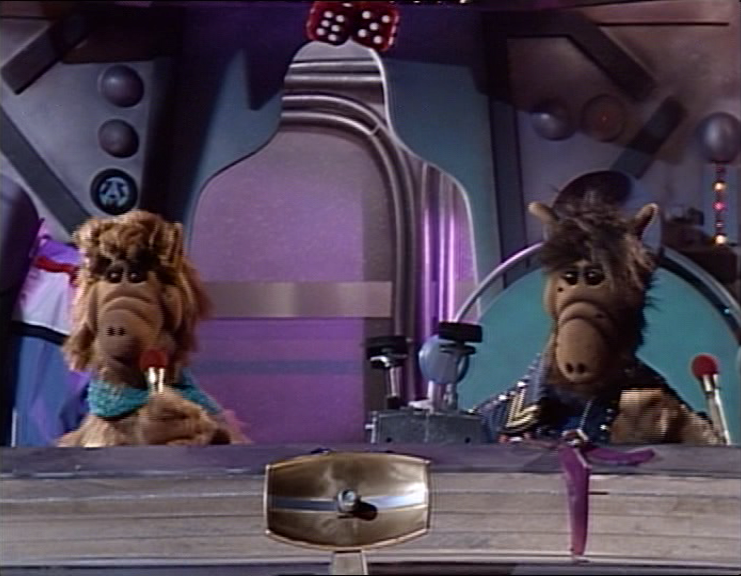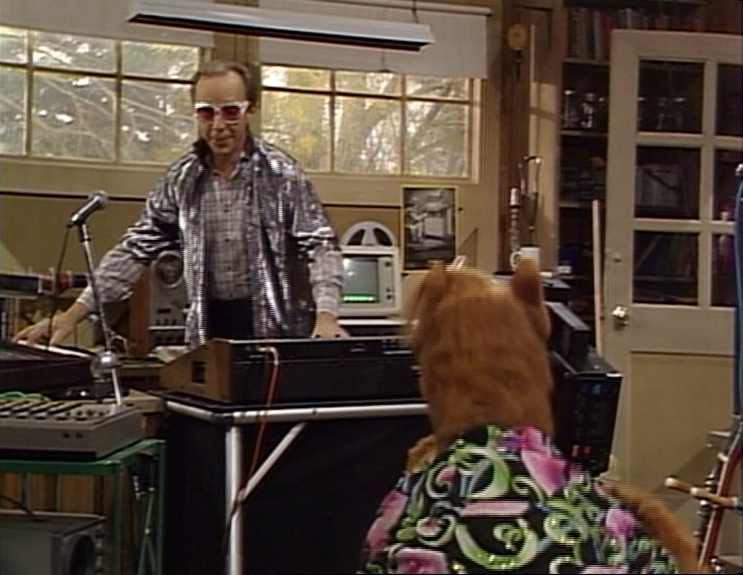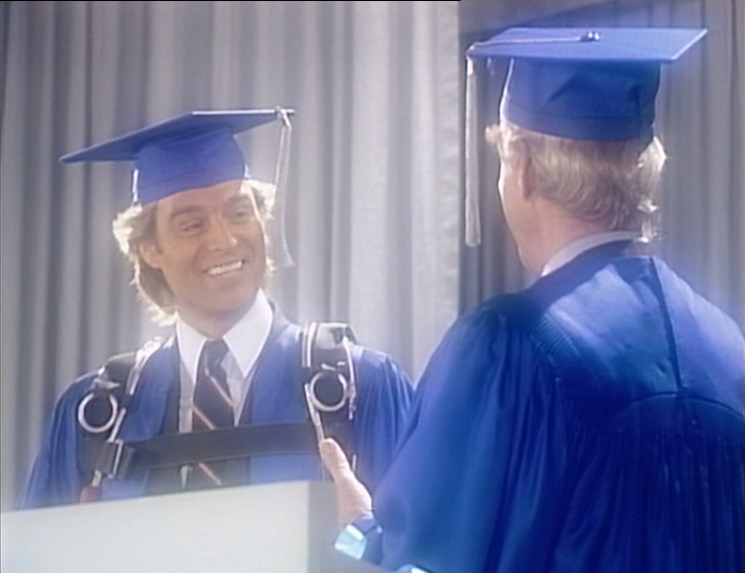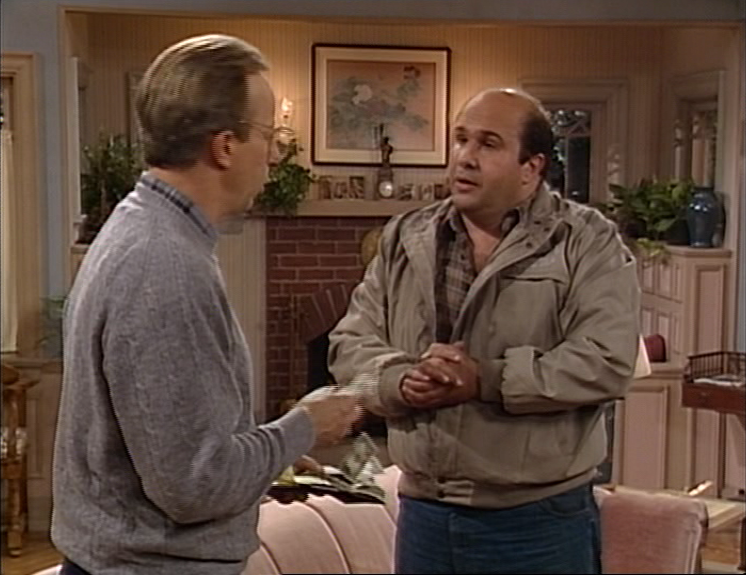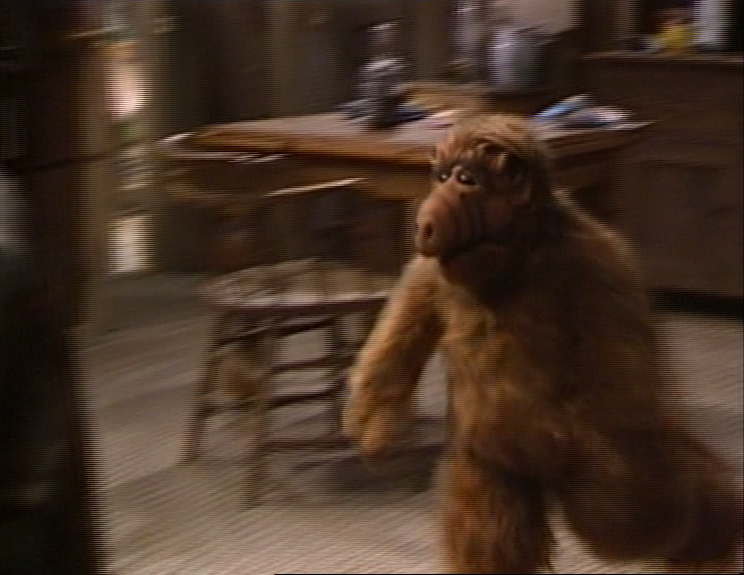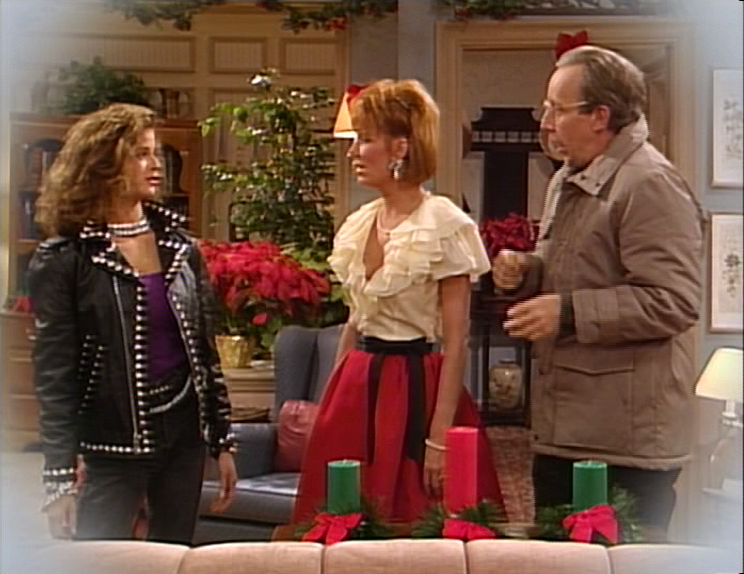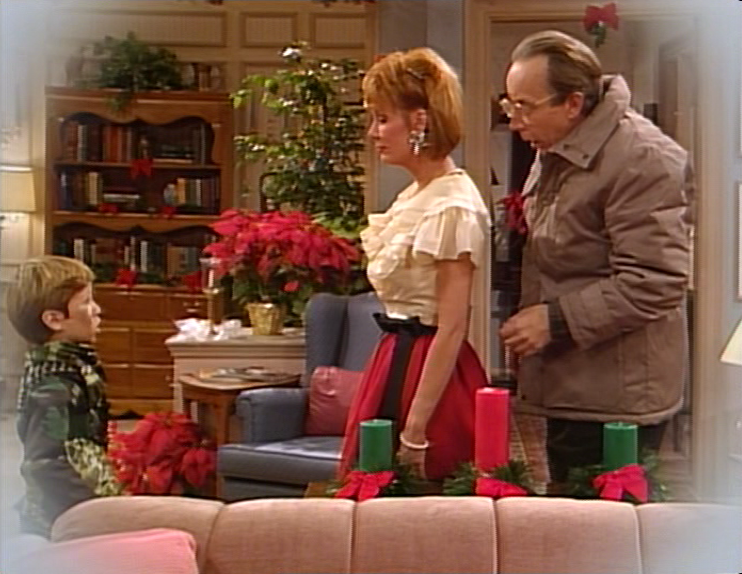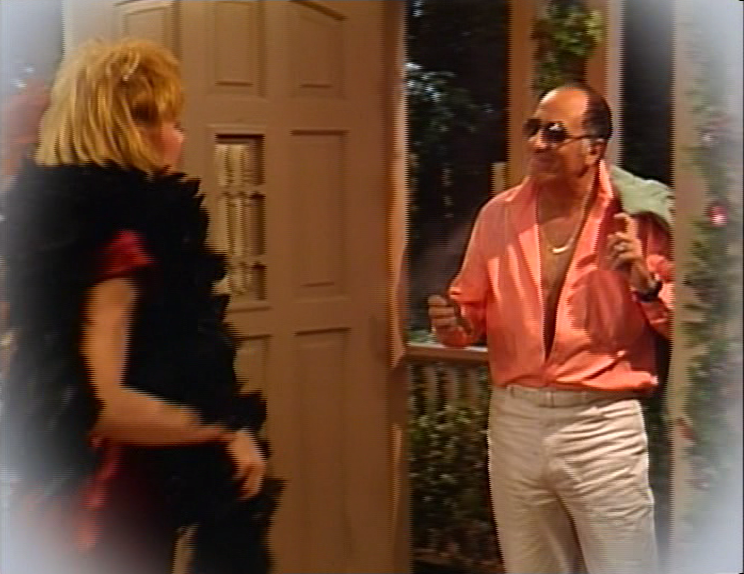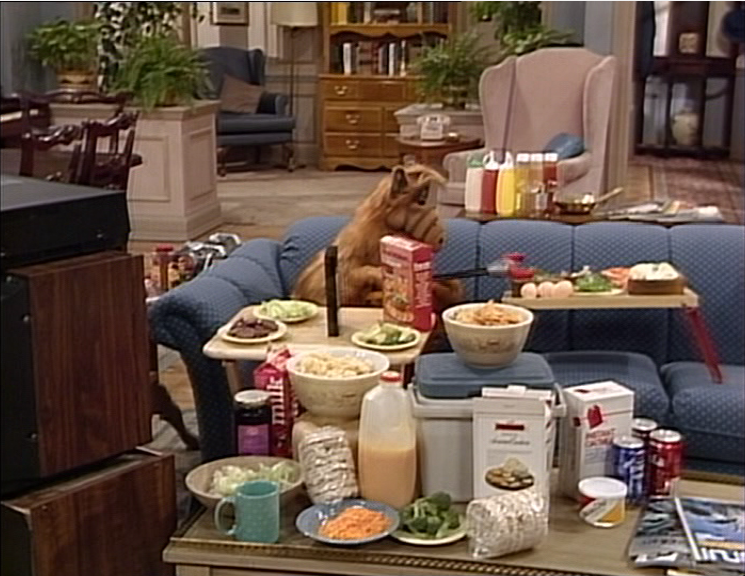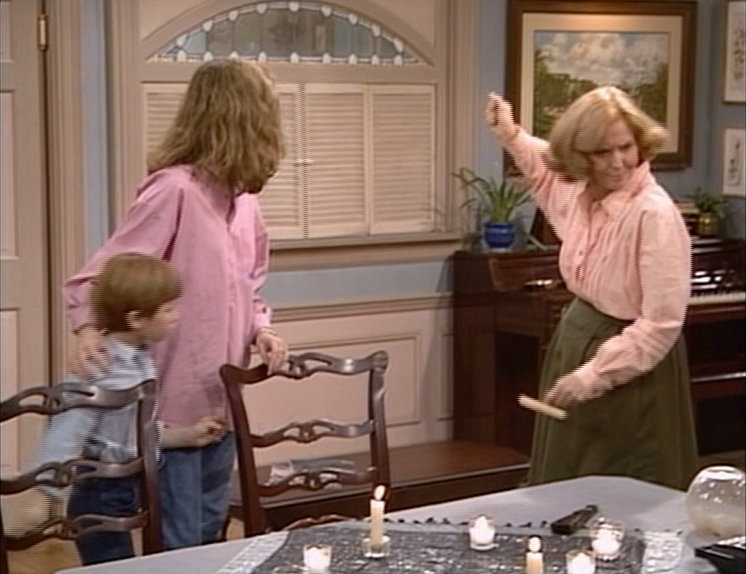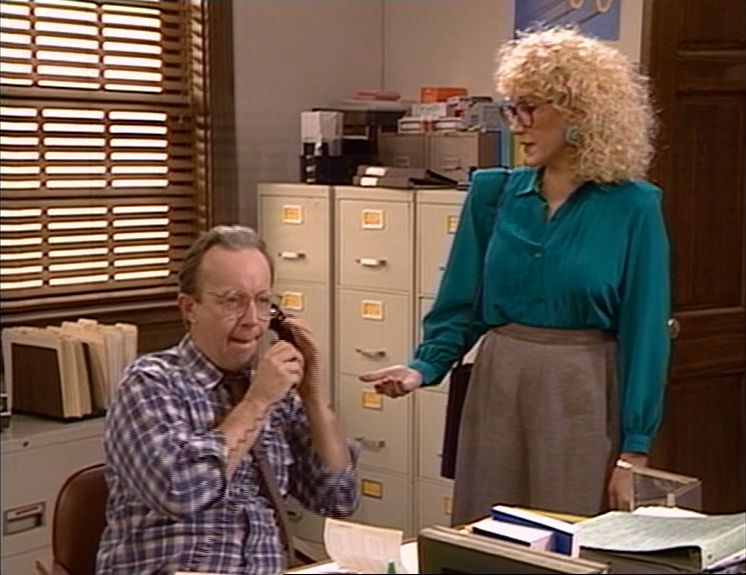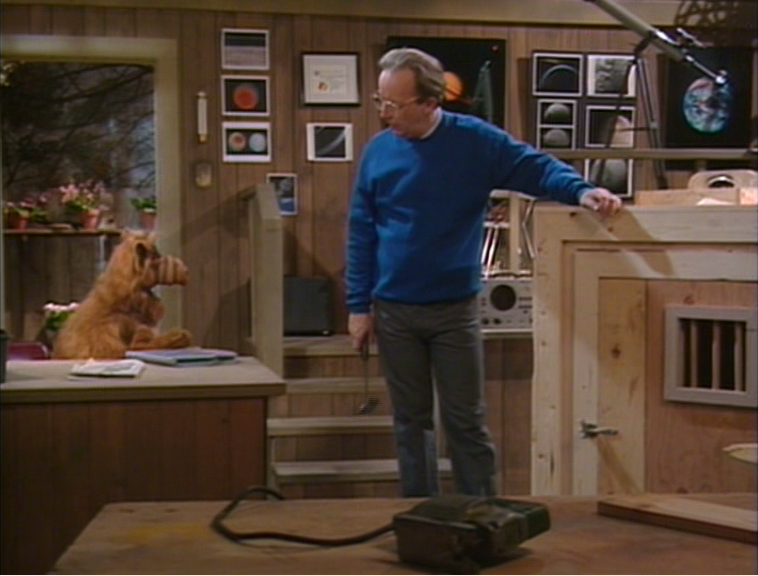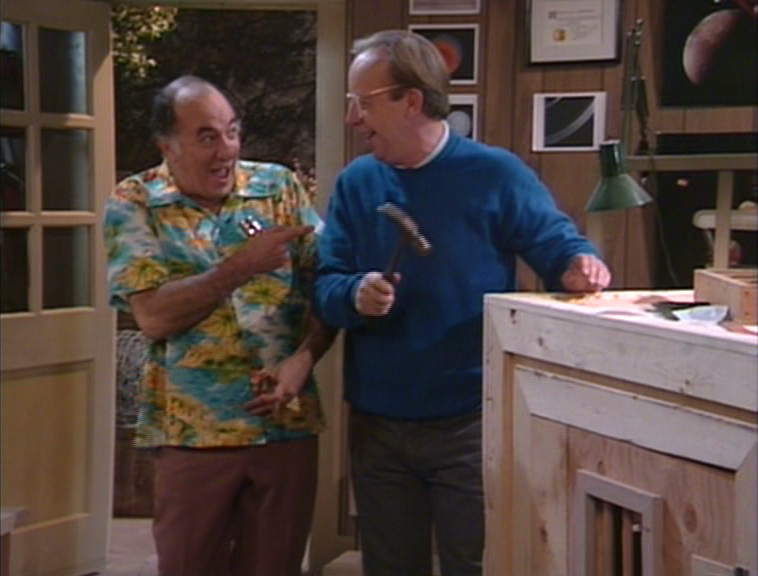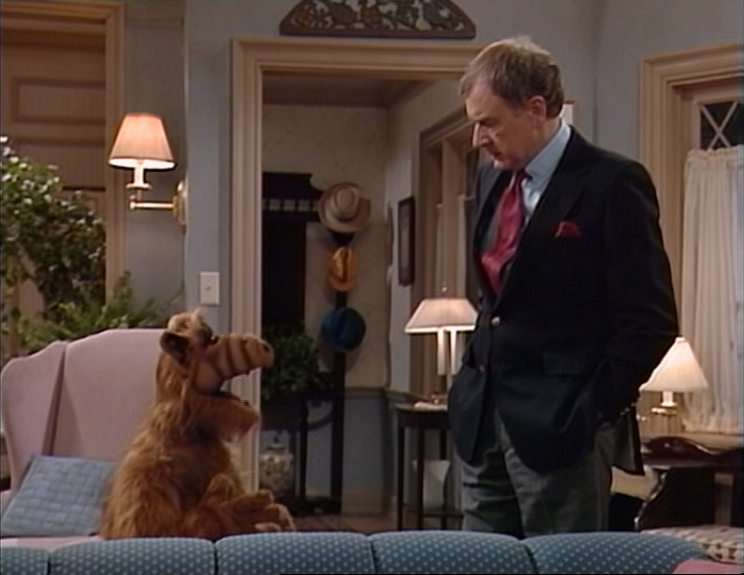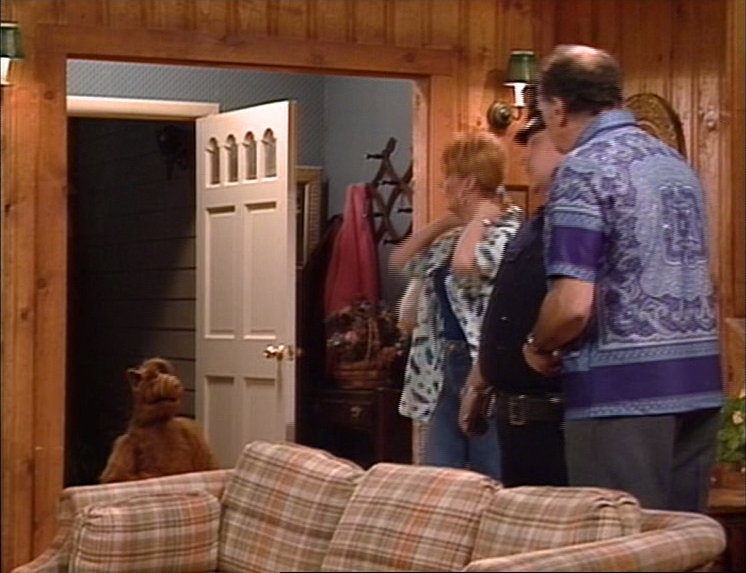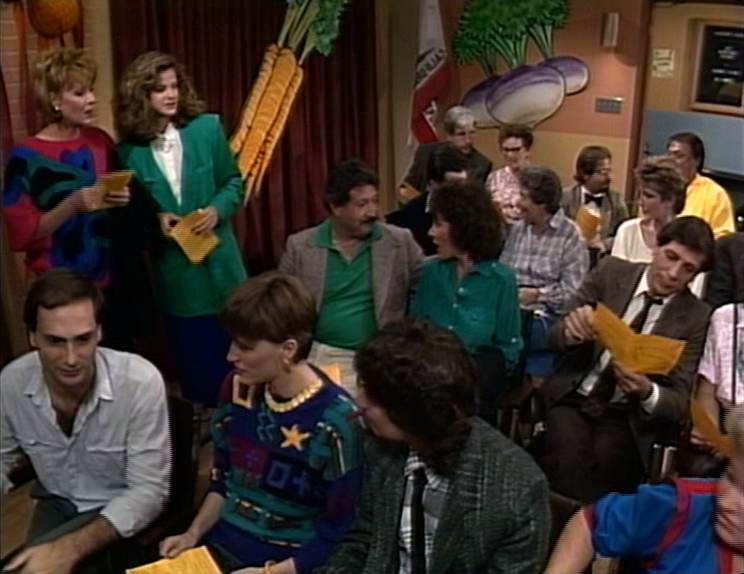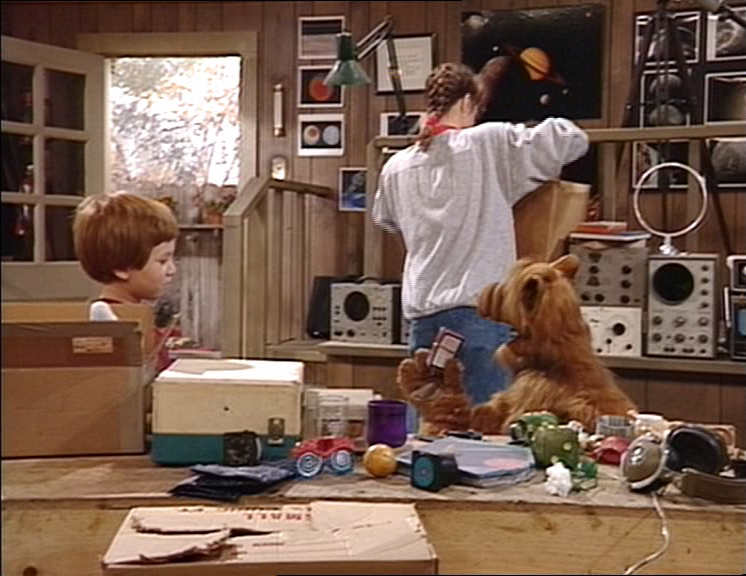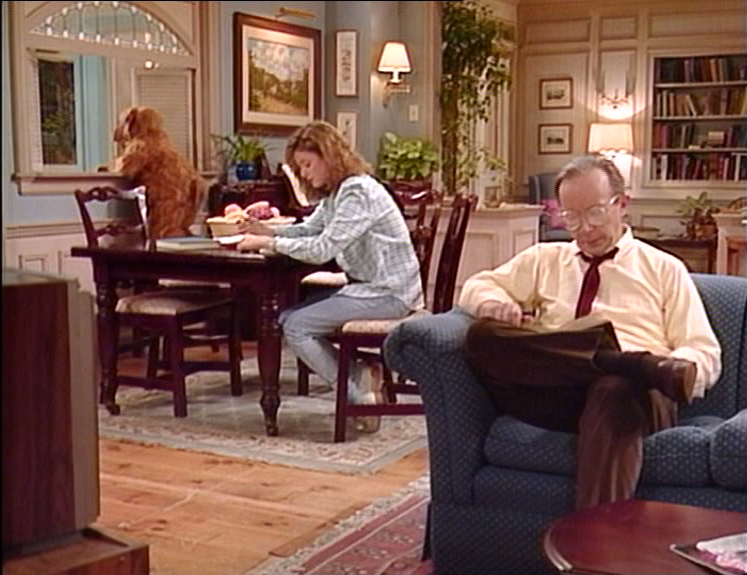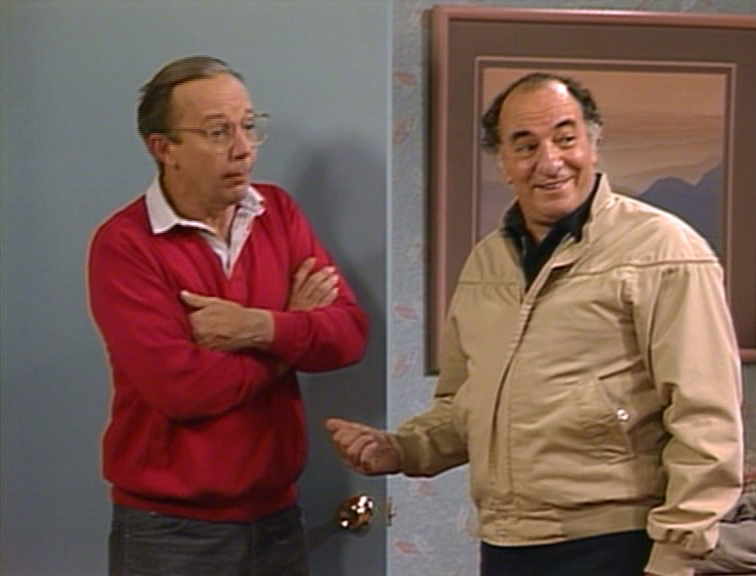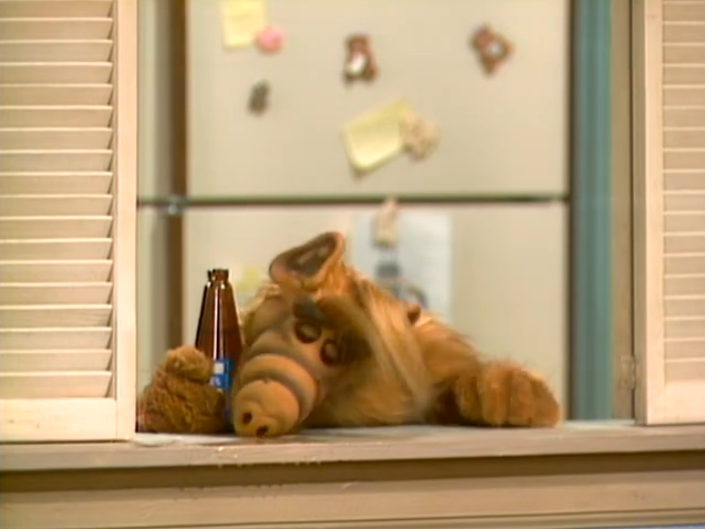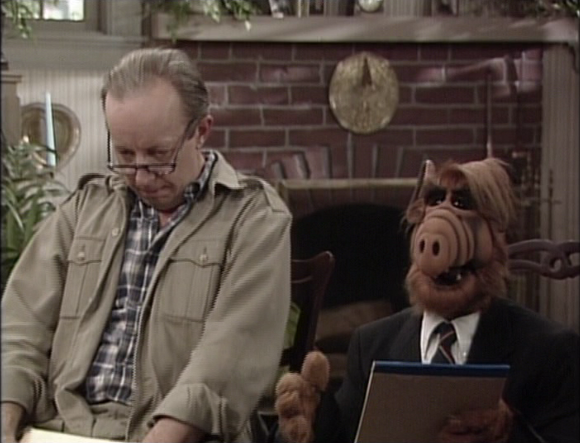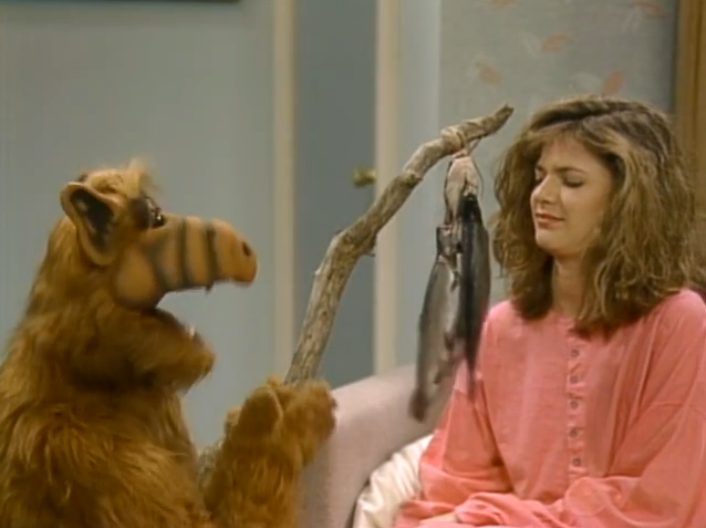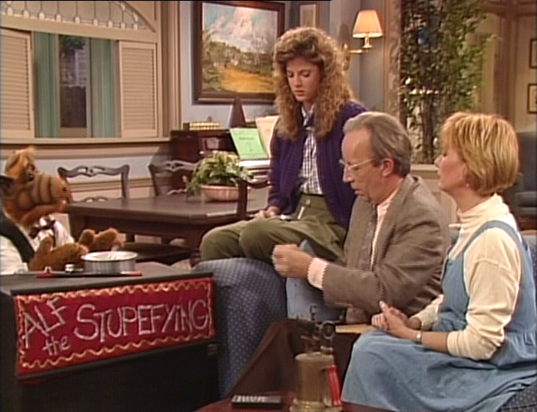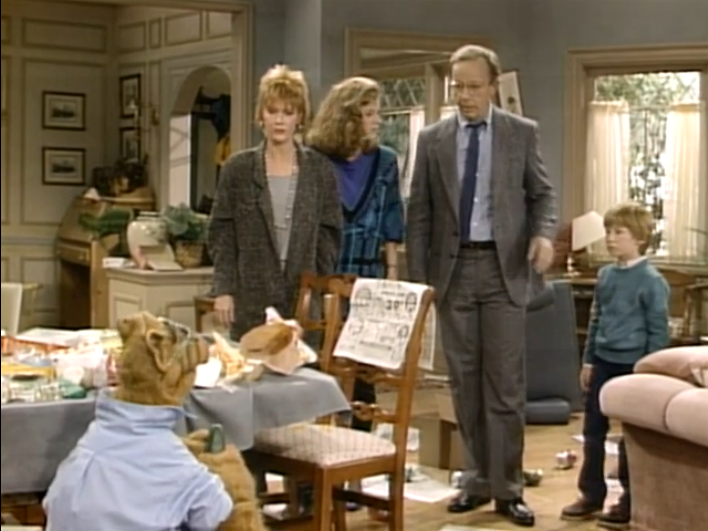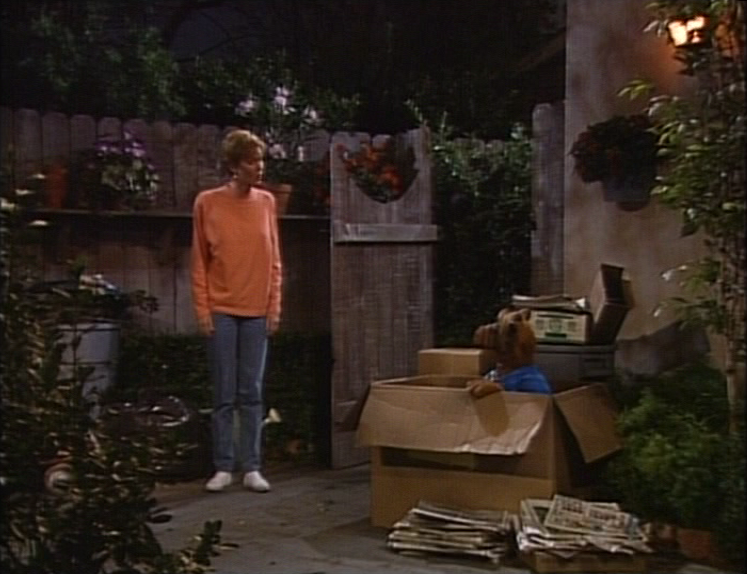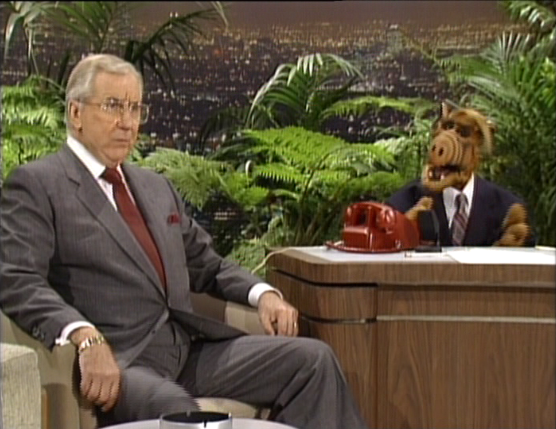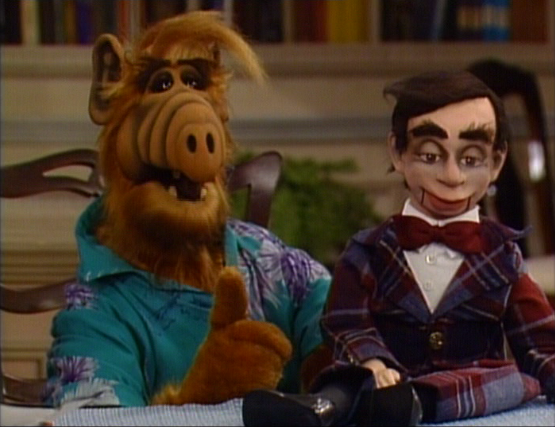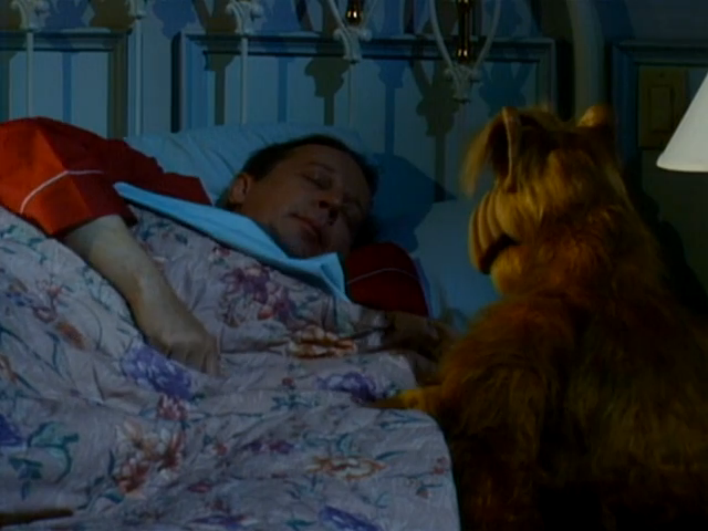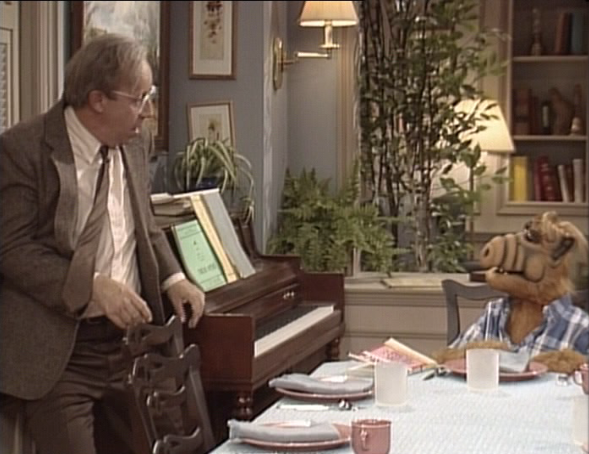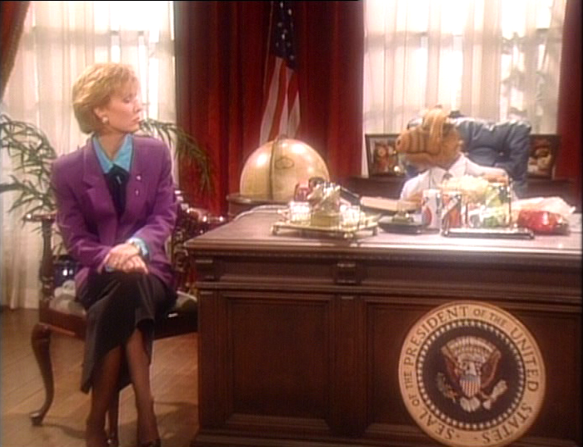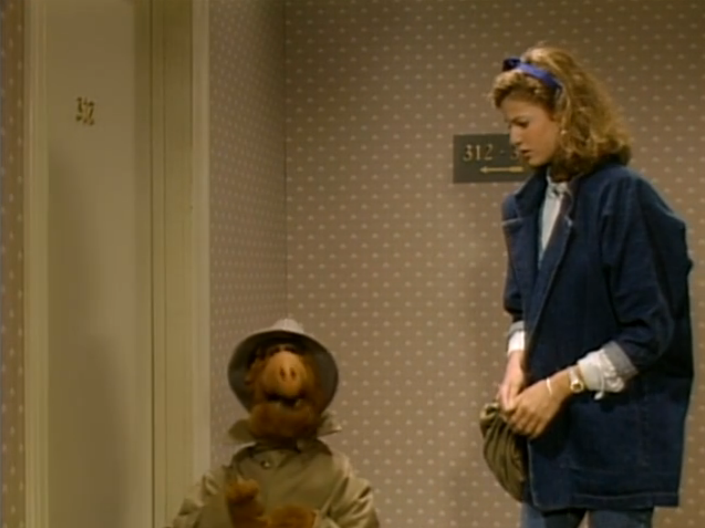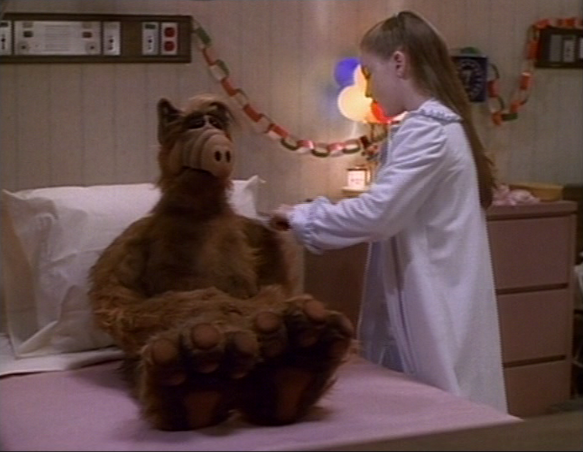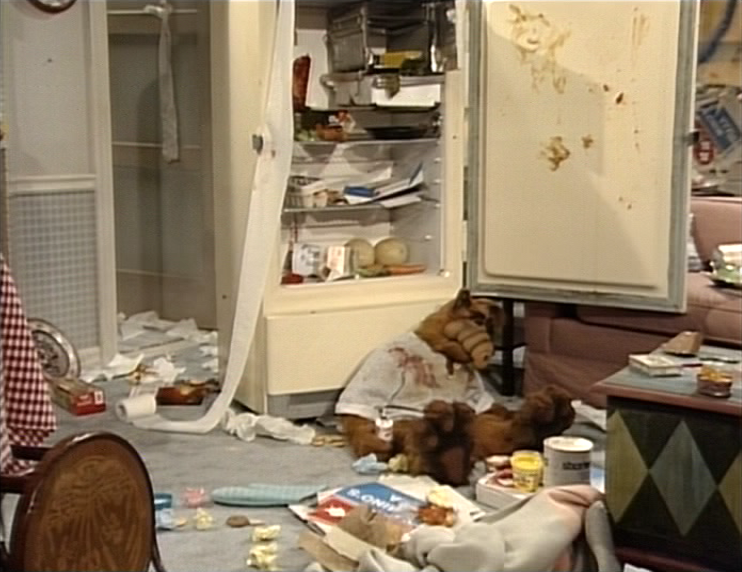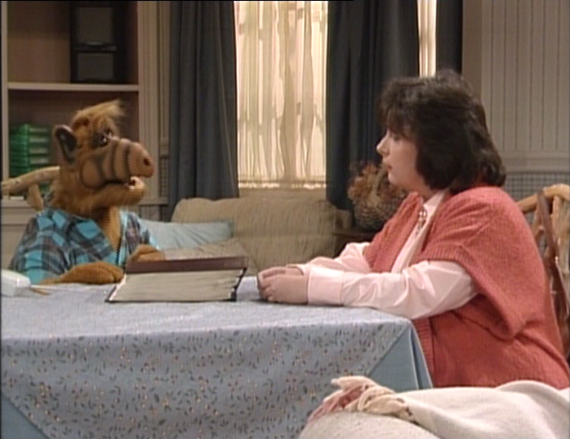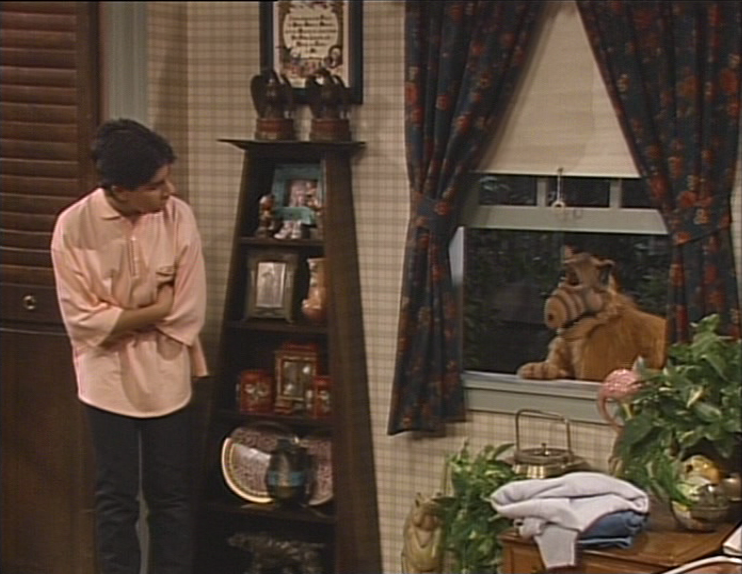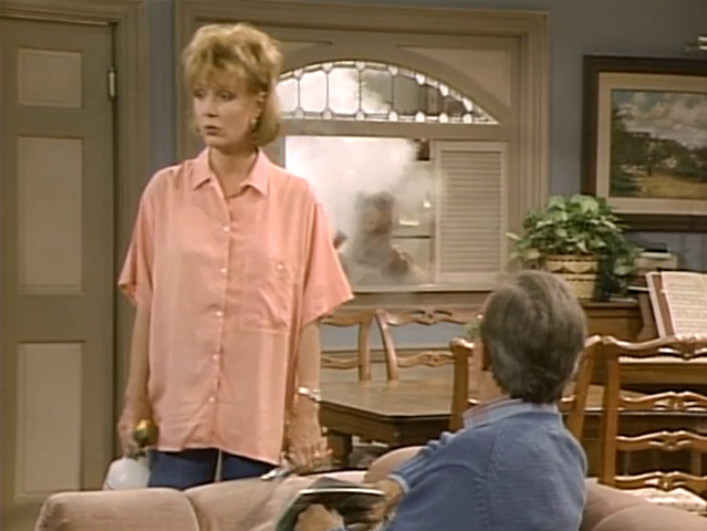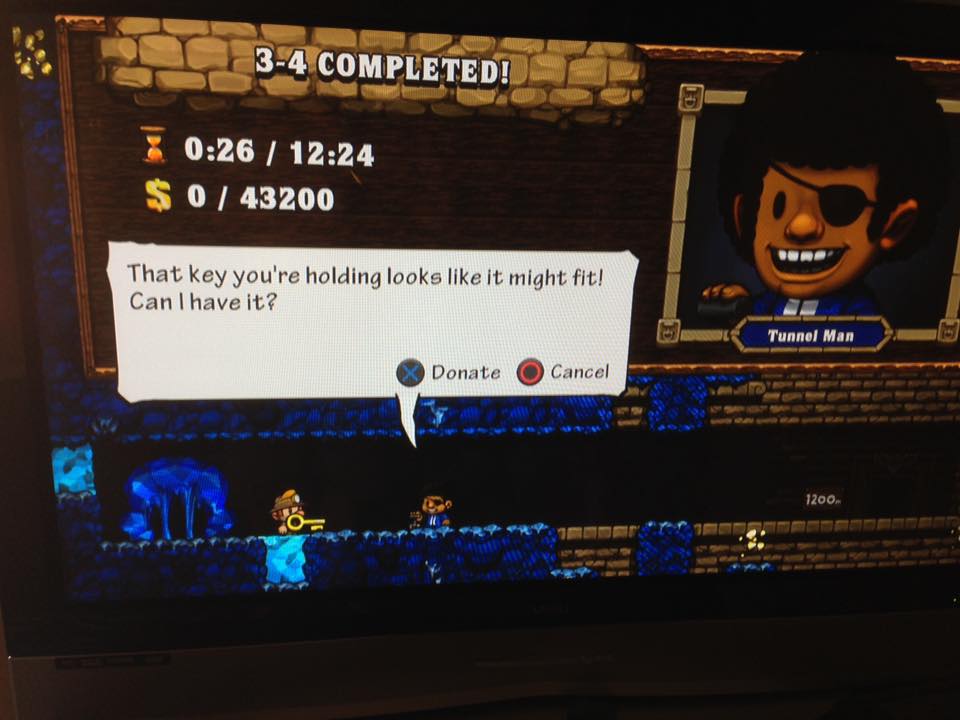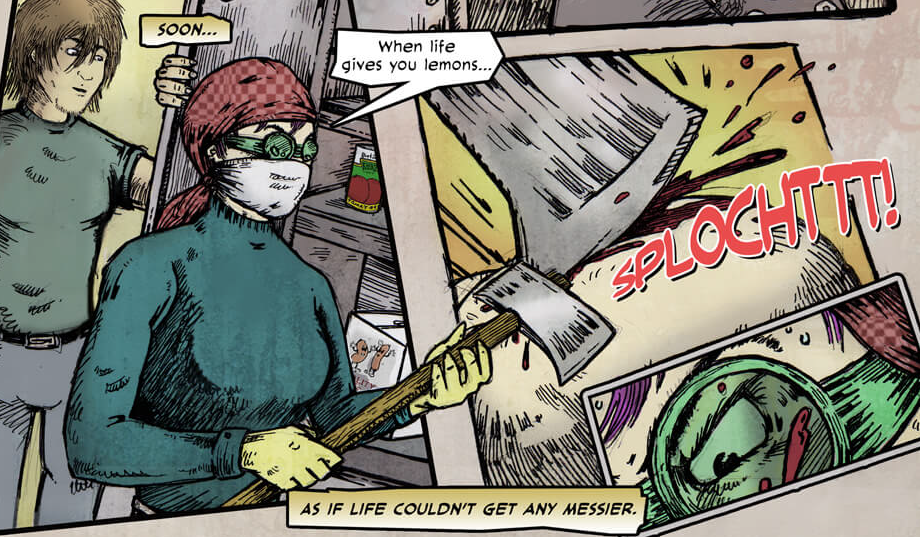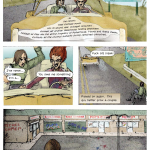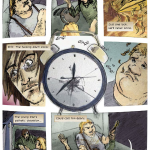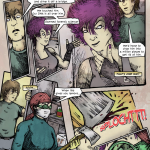And so we begin the final installments in the ALF Reviews series. Forever. And fucking ever god damn.
I’ll keep the introduction short, since there’s a lot to cover: this week I’ll be revisiting season one. Those of you who have been following this blog from back when I had hair will know that my original reviews for season one were based on the syndication edits on Hulu. After that I obtained (courtesy of…well, you) a copy of the German box set that included the full-length edits.
These weren’t necessarily the original edits, though. The broadcast version of “For Your Eyes Only” had ALF and Jodie singing along to the Chipmunks, which never made it to a home video release. “Try to Remember” originally had ALF electrocuting himself rather than hitting his head. (As if that weren’t bad enough, he also told kids not to do that at home. Thank God that was cut!) And in a later season, “Breaking Up is Hard to Do” replaced some actual Pink Floyd song with library music, so now that’s lost to the ages, too.
But, whatever, I said I was going to keep this shit brief. Point is, here we are, filling in the gaps for season one. I’m using this resource to itemize the cuts for me, so if it’s not 100% correct and it missed something I don’t care and, seriously now, neither should you.
I’ll also mainly be covering missing scenes. Snipped lines of dialogue or establishing shots for the most part don’t merit a mention here. I’ll call them out if I find them worth discussing, but by no means consider the below to be an exhaustive list of changes. If you’re interested in that…well, check out the resource! That’s what it’s there for. I’m just here to talk about the times it seems like Willie and ALF fuck each other’s butts.
On with the show!
Season One, Episode One: A.L.F.
The first cut scene was actually the very first scene, and it’s the sort of thing that’s hilarious in retrospect. We begin with what looks like a location shot of Willie and Brian, walking hand in hand. Fitting that the only fatherly moment he ever spent with the kid was snipped.
Then there’s some incredibly funny narration. Willie says, “This is the way it began. That extraordinary night. The night…he came!”
It’s an overwrought performance and I can’t stop laughing, not least because they’re framing this story as some incredible, wonderful development for the family, and by episode two ALF is shitting in the tub and fingerbanging the kids.
It really does go to show that there were two different versions of ALF as a character. This narration introduces us to one, but the actual show to follow spent an awful lot of time with the other.
Also, Willie is narrating this in past tense. At what point in his life is he telling this story? From his hovel in Iceland? I really wish “Consider Me Gone” ended with Willie finishing the story in voiceover. “And now our lives are ruined. Ruined forever!”
Another interesting snip: Willie is going to the shed to talk to a friend of his through the ham radio. So Willie really does use the ham radio! Willie really did have a friend! What a spoil of rich syndication cuts!
Look! Brian is doing something! Lynn and Lucky are in the shed! It’s…kind of interesting to see this, actually! The syndicated version opened with just Kate and Willie in the shed as ALF crashed into the roof. This is an entirely different feeling, and it actually makes it seem like the Tanners existed in some form before a sass-talking puppet moved in. No wonder they cut it.
We learn that Lynn also uses the ham radio talk to her friend Natalie, which I wouldn’t buy even if it really was the first thing I was learning about the character. And we learn about our first canonical boyfriend for Lynn: Lash. Willie makes a face when he hears the guy’s name because he knows there are 98 more episodes in which the writers will pair his daughter with all manner of invented idiots just like him.
Then Kate comes in. There’s a bit of domestic patter about Brian not wanting to eat his dinner. He makes a joke(!) about Lucky earning his name because he doesn’t have to eat Kate’s cooking. And then the kids leave and Kate talks to Willie about how he should support his daughter, even if she dates sitcom greasers.
But the most interesting part of the cut here, for me, is that at one point Willie touches the ham radio and there’s a big electric spark. Presumably this is what causes ALF to crash into the garage; in the syndicated version there’s no indication of why he crashed, but maybe this short circuit caused ALF’s navigation system to home in on it. It doesn’t really make much sense if that’s the case, but at least it’s a kind of explanation.
That’s about it for the noteworthy cuts. A few snipped lines elsewhere, and ALF sings “Proud Mary” to dare you to tune in next week.
Season One, Episode Two: Strangers in the Night
This one is still the hastily slapped-together mess it always was, but there is more of an attempt to tie it all together in this version. There’s more of ALF’s narration stitching scenes together, for instance, and he opens the episode with a longer speech. Then he breaks Brian’s Missile Man toy. Huzzah.
A few similar changes throughout…extra lines, extra narration, nothing major. But this version does have a short scene after the credits that the syndicated version didn’t have.
Here we get a Dragnet-aping wrapup that checks in with the characters and tells us what happened after the episode. The robber, as you see, is in a rubber room now, because he saw ALF. That’s the joke.
Then we see the Ochmoneks on their couch (with a helpful subtitle that confirms the spelling of their last name), watching TV. She seems miserable with her husband, which seems to not fit with their later behavior. But, remember, this is back when Mr. Ochmonek wore a white tanktop instead of a Hawaiian shirt, so as far as I’m concerned that means we’re in a dream sequence.
Finally we check in with ALF. He blabs about how brave he was and throws popcorn everywhere. GOOD SHIT.
There is one impressive moment here, though. Lynn rubs his head, and ALF slides down under the table in ecstasy. Okay, that’s gross, but the cool thing is that you can see ALF do it. Like, you see his head above the table, then as he slides down you see his feet appear from under the other side. It’s a nice bit of puppetry that uses the furniture to block out the logistics in a pretty neat way.
ALF’s season one voice is definitely gruffer and not nearly as smooth as Fusco’s later performance would become. It almost sounds like an entirely different performer. In fact, it’s not until “Lookin’ Through the Windows” that the voice “steadies” into the one we remember.
Season One, Episode Three: Looking for Lucky
A bunch of small snips nobody cares about, but there are two bits cut from the montage, including Willie and Brian looking for ALF in a dumpster, presumably while the piano outro from “Layla” plays in their heads.
Then there’s the sight gag you see in the screengrab. It’s a rare location shot, so it’s notable for that. It’s also one of the only actual “jokes” in the montage, so you have to wonder why it was cut.
And, man, doesn’t the sight of that storefront just make your mouth water for fresh meat? Mmm. Condemned butcher shops.
Actually, wait, so…ALF knows the word “delicatessen” but doesn’t know that that’s not how “cats” is spelled? God dammit, ALF.
But, okay, the real reason I’m pointing this out? Man, you probably can’t tell from the still image, but that had to be the most treacherous day of work for the midget. The box he’s standing on really teeters precariously.
It could just be a very good practical effect that makes the situation look more dangerous to the actor than it really was.
Or, of course, it could be they didn’t care about the safety or happiness of their actors at all.
IT IS IMPOSSIBLE TO KNOW
Season One, Episode Four: Pennsylvania 6-5000
Lots of cuts with ALF bitching on the phone about nuclear weapons and singing the Jetsons theme song, because of course he does. Then there’s a lot of horseshit non-comedy with the two guys who aren’t Reagan aboard Air Force One. It all sucks massive dick.
Until one scene that miraculously does not! It’s actually kind of good.
Kate goes to visit Willie in prison, as she does in the syndicated version, but the scene is much longer here. Willie is terrified, and breaks down crying to his wife. “They fingerprinted me!” he sobs. She consoles him by saying, “It washes right off.”
Then they talk about the awful things they’ve seen prisoners go through in Midnight Express and Papillon. She again tries to cheer him up by saying that the prisoners in Stir Crazy didn’t have it so bad, and Willie replies, “That was a comedy!”
Brilliant stuff? Hell no. But it was clearly the best scene in the episode, and the one the actors have the most fun with. It was probably also the most fun to write, but there wasn’t a puppet in it so out it goes.
(I did see this scene in the clipshow “Try to Remember,” but it’s nice to watch it in context and establish beyond the shadow of a doubt that it really was the best part.)
Season One, Episode Five: Keepin’ the Faith
Hey, were you hoping for a longer version of the scene in which ALF gives Lynn “a Terry Faith facial”? Too bad! Here you go!
This time he applies some red shit to her face over the brown shit, and moans and groans revoltingly for an even longer period while he does so. It’s fucking gross. Well, gross-er.
Then the phone rings and Brian gets it, and we actually get to hear ALF on a sales call. In the syndicated version it seemed more like ALF was just buying a whole bunch of makeup and shit. Having this part of the scene restored makes it clear that he is actually successfully selling it to people and not just stockpiling it. So that’s nice, but through the whole thing you have to imagine that Lynn is in the other room rubbing alien cum out of her eyes, so it’s kind of hard to appreciate.
One line wasn’t cut, but I overlooked it when I heard it originally. In retrospect it’s kind of neat: ALF wonders during the makeup party if Willie’s “doing his card tricks again.” In “Do You Believe in Magic?” we found out that Willie actually does do card tricks. Accidental continuity, I’m sure, but that’s nice.
Less nice is the scene of Willie rubbing lotion on some lady’s tits.
Don’t ask me why.
She asks him to apply it for her, and he asks her where to apply it. She says, “Wherever you think I need it.”
So he rubs it all over her chest, and she lets him do it while he makes awkward faces.
…but if he finds this awkward, why did he do it in the first place? If she said, “Rub it on my chest, silly!” then maybe he would have been stuck. But instead she left the door open for him to rub it on her hands or something more innocuous and he leapt right for her melons, so I don’t know what the fuck is going on.
There’s also a cut part toward the end where some fat lady hears someone say “guacamole” and she gets all excited because she is fat.
So, yes, “Keepin’ the Faith” actually used to be way worse.
Season One, Episode Six: For Your Eyes Only
This one has one major cut toward the beginning of the episode, as Willie and Kate head out for their anniversary dinner. (Hey, remember when Willie remembered his anniversaries?! I definitely didn’t!)
ALF is sad that his anniversary party won’t by attended by the couple actually celebrating their anniversary, so he tries to get Brian and Lynn to celebrate with him instead.
Brian can’t stick around, though; he’s spending the night as his friend Scott’s house. (Hey, remember when Brian had friends?! I definitely didn’t!) He says that Scott’s turtle died, and they’re going to flush it.
Then Lynn says she’s going to Julie’s house, and ALF asks, “What’s she flushing?”
And that’s a really good joke, actually! But the syndicated version of this episode was still pretty good, so losing a moment like this didn’t hurt it too much.
Still, I wish it stuck around. It got an actual laugh out of me.
Season One, Episode Seven: Help Me, Rhonda
Standard dialogue trims in this episode, but there are a few other things of note, mainly to do with the non-ALF puppet scenes.
The fantasy / flashback / dream (all three?) sequence on Melmac is extended, with some more gentle ribbing among ALF and his chums. At one point Skip makes a joke and says, “I kill me!” which seems to imply that that’s more of a general Melmacian saying than it is ALF’s specific catchphrase. That’s interesting.
They talk about wanting to fuck the waitress for a while, and ALF does one of those things where he wonders aloud about what would happen if the planet ever exploded…which is immediately followed by a loudspeaker somewhere saying, “Orbit Guards, man your battle stations. Nuclear devastation on its way.” Not really a clever joke or anything, but I’m bringing it up because it’s just a hair more insight into the destruction of Melmac than we had.
Of course we know that at this point ALF leaves to shovel a bunch of souvenirs into his space ship instead of rescuing anybody, including the two friends he’s sitting with at this very table. (One of whom actually came to Earth later to rescue him. Twice! Fucking ALF…)
As he leaves ALF says, “Listen, if you see Rhonda, tell her I lo… Don’t tell her anything.” It’s a decent moment, as his friends were ribbing him about his crush on her a moment ago, and it makes sense both that he’d hold back on this declaration and that he’d regret doing so.
In a later scene, Skip and Rhonda make contact with ALF over the ham radio, as they did in the syndicated version. This time there’s some more dialogue, which isn’t surprising. But we also see their puppets and their ship, which is surprising, as the syndicated version was deliberately re-edited so that we only heard them; the camera never left the Tanners’ garage.
That’s an odd choice to me. Why find different footage and re-edit the audio so that we wouldn’t see the puppets? The footage already existed; it took more effort to cut Skip and Rhonda out than it would have required to leave them in. It’s really strange.
At one point ALF jealously asks Rhonda, “What are you doing with Skip?” and Skip mutters, “Not much.” So I guess she wasn’t giving it up to him after all. She tells ALF, “You’re the only one for me.” But we’re still not supposed to think ALF is an asshole when he blows her off at the end of the episode without explanation.
But hey, as long as she’s not romantically receptive to anyone else, ever!
Also, throughout the episode a bunch of characters sing “Help Me, Rhonda” at various points, which didn’t happen in syndication. This was presumably cut to avoid having to pay royalties, or because they didn’t have the rights to use it beyond the initial broadcast. Even ALF’s friends on Melmac sing it, so that’s another piece of Earth media they somehow had access to.
Season One, Episode Eight: Don’t it Make Your Brown Eyes Blue?
In this episode Lynn lusts after Scott, which we already knew. But now that we’ve seen the cut scene from “For Your Eyes Only” we know that Brian was hanging around with a much older boy, and when Scott invited him over to “flush the turtle” his parents really should have intervened.
In the full version of this episode, ALF angles for romantic advice, so Kate tells him about what Willie did after they’d been dating for about four or five months: he found out that Kate liked cream of mushroom soup, so one day he packed her car full of 500 cans. ALF replies, “So you’re saying I should do something pathetic.”
Yep…best line in the episode, snipped.
Then we get a scene later in which Willie and Kate lay together in bed worrying about what the kids would look like if ALF got their daughter pregnant.
I’m not joking. It’s fucking disgusting.
BUT THEN, finally, the cut scene I’ve been waiting for since I reviewed this episode originally: ALF filming Willie, who performs “Saturday Night’s Alright (For Fighting).” Inspired by the music video ALF made for Lynn, Willie makes this one for Kate. And while ALF’s was horseshit, this is actually pretty funny.
It works on a few levels, not least of which is the fact that the song is utterly inappropriate as a romantic gesture. It goes beyond the standard funny outfit / song reference style of humor ALF was frequently keen to rely on.
Lynn comes in and she and ALF talk about how to make the music video more exciting, such as by using smoke pots and by having Willie swim in lava. It’s not fantastic, but it’s the best scene in the episode. Needless to say, it was snipped so we’d have time to watch ALF’s fucking music video twice.
Season One, Episode Nine: Jump
We get one of my pretty big questions about “Jump” answered when the syndication cuts are restored: who was that other guy graduating with Willie or whatever the living shit was happening? In the syndicated version he was just sort of there with Joe Namath and the Indiana Jones guy.
Now we find out. Like everyone else in the dream, this is someone who got to cum in and on Willie’s wife whenever he wanted to. In fact, another earlier scene even sets this up, when the family is looking at Kate’s old photos and finds one of him. His name is is Animal Hohnerheim, which also explains where her daughter got her taste in men.
I can understand this being cut for time, but it’s unfortunate that he still appears in the syndication edit, as it makes the episode look even more poorly written than it was.
Anyway, the guy giving out diplomas or degrees or whatever says to Animal, “You’ve won the Indianapolis 500, you’re listed in the Fortune 500, and in the National League you’ve batted 500.” Then Animal says, “I gotta run! We’re having 500 people over for dinner tonight!”
Not hilarious but certainly one of the few jokes in this episode that seemed to require any degree of creative effort.
At the very end of the episode, Lynn mentions that she wants to skydive as soon as Lash gets his pilot’s license…and Lash was the boyfriend from the snipped intro scene of “A.L.F.”! Look at that. An entire romantic arc with Lynn was lost to syndication. Which is probably for the best, since she wanted to suck a completely different guy dry in the previous episode.
Season One, Episode Ten: Baby, You Can Drive My Car
In the full edit of this episode we meet the tow truck driver who brought the Tanners home. He helps them with their groceries, and it’s not a great scene or anything but once again it does have some of the best material in the episode.
The driver is played by Robert Costanzo. You look at him and think, “Haven’t I seen him in something?” And you have! The answer is that you’ve seen him in everything. Seriously, look at his IMDB page sometime. I’m surprised the guy has time to breathe he’s been in so much. Comedy, drama, sci-fi, fantasy, animation…he’s done pretty much anything you can imagine. And he’s not bad at all here, elevating his pretty ropey material.
When he first comes in with the bags he says, “Sorry about my tow truck breaking down. What do you suppose the odds were on that one?” Which is a decent line, but he definitely gives it a better delivery than any of these other actors would have.
Then there’s some pretty annoying, padded bit where he and Willie try to figure out how much the bill should be, since they both helped each other with their vehicles. The guy decides on $50, and Willie asks who is paying who. The guy laughs and then says, “That’s a good one. Cash will be fine.” Again, not great, but the performance sells it as an effective punchline.
As he leaves he says, “You might want to consider a new set of brake pads. I should have never towed you with the emergency on. My mistake!”
It’s a pretty good performance for such a minor part, and it definitely would have improved the episode. Then again, ALF isn’t in the scene so FUCK IT.
We find out in this scene that the friend Lynn was going to see the concert with was named Kathy. Not sure if that was in the syndicated version, but it’s another friend!
Some other cuts later on involved a longer scene of Lynn studying for a job at Mr. Jim’s Chicken and Oysters, and a trim to the scene in which she practices serving the food to her family in which Willie says Mr. Jim’s Chicken and Oysters sucks balls.
Season One, Episode Eleven: On the Road Again
They cut a scene of the midget running across the room.
Mother fuckers.
Otherwise just some dialogue trims throughout. There’s a moment when Brian thinks he sees ALF outside of the camper, but Kate corrects him and says it’s only a rotted tree stump. That’s good.
And there’s a weird bit with some voiceover from Lynn. In the syndicated episode she was writing a letter to a boyfriend, but in this version we can “hear” what she’s writing, and it’s a plea to be rescued from this shitty vacation. (As I asked in the episode review, though, how does she intend to get the letter to him?) We also find out that the boyfriend is Lash!
Man, that character just can’t catch a break. He was referred to in three episodes, and chopped out of each of them.
Another snip has ALF fantasizing about eating pork and beans out of a can during the camping trip. Some more accidental continuity, as this was also something he looked forward to — and finally got to do — in “Night Train.”
Season One, Episode Twelve: Oh, Tannerbaum
The opening was snipped, and we lost Willie’s alarm clock playing “Jingle Bell Rock.” We also lost “Happy Birthday to You” in “Jump,” and the other musical moments I mentioned in other episodes, so it’s clear that a lot of these snips were to avoid having to license or pay for the songs again.
We also learn in that brief snipped moment that Willie’s Uncle Doug has been dead for two years by this point. We hardly knew ye.
There’s another snip later where we learn that ALF can read Japanese. He translates the tree assembly instructions for Willie: “So, you weren’t able to buy a real tree.”
Decent little joke, if not for the teeny tiny fact that WE NOW HAVE TO BELIEVE ALF CAME TO EARTH KNOWING BOTH ENGLISH AND JAPANESE.
The main cut in the episode comes in Willie’s nightmare. In the syndicated version this sequence did seem odd; his family loved him, ALF came over to fix the tree, and then Willie panicked. It seemed like pretty odd nightmare material, but in the unedited version it makes more sense.
ALF “fixing” the tree causes the family to realize it’s fake, and the holiday unravels. Lynn is suddenly dressed like Barbarino and refers to her “boyfriends” coming over to pick her up, which makes this canonically the first time she’s been up for a gangbang.
Then Brian comes in and is fucking terrible. He’s in military fatigues with a bandolier and he says, “Bye, mom. I’m leaving before some unnamed Central American country.” If it weren’t for the transcript on the syndication cuts resource I’m using, I never would have known that he was supposed to say, “I’m leaving for some unnamed Central American country.”
He then says he’s off to “stem the tide of Communism,” and delivers the line about as well as you expect he did.
Then the doorbell rings, and it’s Mr. Ochmonek! That’s good enough for me, but Kate says, “That’ll be my lover,” and leaves to go fuck him in the yard.
You know how I always used to wish Kate and Mr. O would run off together and star in a much better sitcom of their own? Well, merry Christmas to me!
This whole sequence would have elevated the episode, and it’s a real shame that it got cut. Again, it’s not because it was great, but because the episode was about Willie fretting about the Christmas tree, and how important it was to him. When it gets ruined and he can’t find a replacement, it makes sense that he’d fall into this anxiety spiral.
In syndication, this episode just seemed like your run-of-the-mill season one trainwreck. The full version, though, actually explores its central idea, and looks far more competent as a result.
This was a significant loss.
Season One, Episode Thirteen: Mother and Child Reunion
The most notable snip in this episode comes at the very beginning. ALF arranges himself in front of the TV in a way that he won’t have to move for the rest of the night, as he can reach all of his snacks with one of those claw toys kids used to play with. (Now they just sext.)
It’s…okay. It’s not funny, but I like the idea that ALF would do this. I like much less the idea that he’s doing this so he can masturbate to a Jane Fonda workout video without interruption.
The rest of the snips in the episode are just Kate Sr. bitching about more things, such as the cleanliness of the bathroom, and pretending not to know what Willie does for a living. (Lady, I didn’t know for a long time, either.)
Those snips don’t remove anything great, but having them back does make the family’s eventual irritation with her land a little more believably, so it’s a shame to lose so much of it.
Season One, Episode Fourteen: A Little Bit of Soap
Literally nothing important. Some snipped dialogue nobody cares about, and longer edits of the bullshit soap opera ALF writes for.
It’s all garbage. Next.
Season One, Episode Fifteen: I’ve Got a New Attitude
There’s a moment cut from the seance scene in which the shutters over the plot window move on their own. Afterward, Kate Sr. finds the wire ALF rigged up to create that effect.
It sounds a hell of a lot better than it actually played out, and it might have been cut for that reason.
That’s the kind of syndication cut that should happen; a good idea that just didn’t play as well as it should have. I’d say the episode is improved by removing that moment, but since it’s a pile of shit either way I guess that doesn’t say much.
Season One, Episode Sixteen: Try to Remember
A clip show. A few flashbacks to other episodes were removed. Nothing of note, thank Christ. Moving on.
Season One, Episode Seventeen: Border Song
Willie makes a hideous face and acts like a dick to his secretary.
There’s a lot more interaction with her (and a bit more with his boss) than what we got in the syndicated version. It still sucks a fat one, don’t get me wrong, but since this is one of only maybe two episodes in which Willie acts like a social worker, it’s unfortunate that we lose this slice of his worklife.
Neither of these characters were ever seen again, so it makes sense that they’d be chopped out in retrospect when the episode needed to be shorter, but once again it’s not like anything else in the episode was worth keeping, so losing this narrow window into his job is a shame.
Season One, Episode Eighteen: Wild Thing
Now this is an interesting case, as the syndicated version of “Wild Thing” was something like forty seconds long. Seriously, it was way shorter than the other edits, and the bulk of the missing material comes from the scene in which Willie builds a cage for ALF.
Throughout there are dialogue trims, of course, but of those the only really interesting one is when Lynn outlines the problem with the episode. She says, “Let me get this straight. You’re going to act strange and you’re going to eat cats. So what’s the change?”
Those of you who picked up from the review that ALF in “super crazy” mode was no different than normal ALF can take solace in the fact that the writers recognized this too…even if they did nothing to address it. ALF explains that it’s a matter of degree. “Imagine ALF to the tenth power,” he says, so I guess he’s 10 times as strange and wants to eat 10 cats.
The cage building scene is mainly just ALF telling Willie over and over that the cage he built sucks shit. And, again, this scene addresses another problem we had with the syndicated version. ALF produces a photograph of the last cage they built, and Willie says, “That’s all iron and steel!”
And…well…of course it fucking is, Willie. It is a cage. You built a crate. The script doesn’t make his obvious fucking misunderstanding of what a cage is more explicit, but it at least acknowledges that we aren’t looking at one.
We also learn a few more MELMAC FACTS from ALF’s photo album: he has a step cousin named Kendall, and a godson named Jed. There’s also a cute little moment here when Willie says, “You photograph very well.” ALF replies, “You know, I never thought so.”
It’s kinda great, and in just two lines we get what would have been the best part of the episode. (The photo-album-as-expository-device is also an effective method of moving the plot along in a fun way, and I’m surprised the show never really returned to that.)
Then Mr. Ochmonek comes over singing “The Lady is a Tramp.” This was obviously cut for music rights reasons, but that doesn’t explain why the scene up until this moment didn’t stay in the episode. Anyway, it’s not great, but it’s always nice to see the guy, and this provides another little bit of continuity with the Ochmoneks’ love for Frank Sinatra.
ALF sings along when Mr. Ochmonek arrives, so Willie pretends he was the one singing. This excites Mr. O, who then forces Willie into an awkward conversation about Frank Sinatra, about whom Willie seems to know very little. Again, nothing great, but it’s nice to see Willie trying to feign common ground with the guy as opposed to giving him a titty twister and kicking him off his property.
The funniest line in the episode comes when Mr. Ochmonek looks at the crate and says, “What are you, shipping a monkey?”
Willie also asks Mr. Ochmonek to catsit Lucky for the night. Losing that doesn’t matter much, but it’s interesting that that development was set up so much earlier in the episode than we saw it in the syndicated version.
Much of this scene is seared garbage, as Max Wright flounders tries to pass off his accidental slip of the word “ALF” as though he meant to say “alfalfa,” but we do learn that Mrs. Ochmonek’s maiden name was Pitzer.
So, yeah, still no idea why so much of this was cut. Any insight into why “Wild Thing” ended up being so much shorter than the other syndication edits?
Season One, Episode Nineteen: Going Out of My Head Over You
It’s fitting that the best episode of season one had one of the best excised scenes…and it’s a relief that the syndicated episode still turned out to be pretty great.
We lose a big chunk of the initial exchange between ALF and Dr. Dykstra. Knowing he’s meeting a psychiatrist, ALF worries about how he’ll be perceived, and starts overcompensating. After they shake hands, for instance, ALF says, “Nice, firm handshake I’ve got there, huh? Good sign, right?”
It’s funny.
Then Dr. Dykstra asks him how he’s enjoying life on Earth, and ALF says, “I just wish there was more love, and less war. Not something a psychotic would say. Right?”
I like everything about this moment. Dr. Dykstra slides from the magic and wonder of meeting an alien into having to make awkward small-talk before the dinner party actually begins, and ALF panics believably when he knows he has the direct attention of a psychologist.
I kinda loved this episode when I saw the chopped up version, and though I really like this exchange I think the syndicated version works well enough without it. In any other episode this might have been the best scene. Here it’s cut without affecting the overall quality, which says a lot about how good “Going Out of My Head Over You” was to begin with.
Season One, Episode Twenty: Lookin’ Through the Windows
And, of course, a shitty dumbass episode had a shitty dumbass scene removed.
At the very end of the episode, when the police are in Mr. Ochmonek’s living room, the lights go out for a moment. Why? Who fucking knows. When they come back on, ALF is standing in the doorway like a fucking idiot. Doesn’t he know people aren’t supposed to see him? Kill this shitfucker.
Willie hurriedly turns the lights right back off, and when they come on again, Mrs. Ochmonek is standing where ALF was. Why? Who fucking knows.
Anyway, this is notable for two reasons.
One, in the syndicated version of the episode, the story ended with the police just accepting Mr. Ochmonek’s claim that he didn’t murder his wife. They don’t investigate anything, and nobody ever attempts to find or reach Mrs. Ochmonek to make sure she’s okay. Here, in the full version, we see why that is: she just shows up and the whole investigation is moot.
But two?
Oh, yes. Two.
Mr. Ochmonek sees ALF.
Yep.
Remember when I used to say that he was the only recurring character who never saw ALF? Well, that was bullshit. He saw ALF here. Just fleetingly, of course, and once Willie turns the lights out he asks, “Did you see something?!” Willie and Kate pretend they didn’t, and when the lights come back on it’s Mrs. Ochmonek standing there instead. (How she didn’t see ALF in this scene I’ll never know.)
But, yeah, Mr. Ochmonek saw ALF. That means that no recurring character went without seing ALF, and makes Paul Fusco’s assurance that they were very careful about who got to see ALF and who didn’t seem even stupider.
Fuck this show.
Hey, is that the last time I get to say that?
I’ll say it louder, then.
Fuck this show!
Season One, Episode Twenty-One: It Isn’t Easy…Bein’ Green
Lots of cuts from this one, but the most substantial cut is the scene of Kate and Lynn arriving at The Nutrition Follies and finding a couple already in their seats. The exchange is…well, it’s silly, but it’s better than anything else in the episode. (Noticing a theme here?) It was also cut, I’m sure, because the puppet wasn’t in it. (NOTICING A THEME HERE?)
The joke is that the audience is assigned seating based on whether their kids are playing meats or vegetables, and this couple says that their kids are potatoes, whereas Kate argues that they’re Cornish game hens.
It’s exactly that stupid, but kind of funny, and it’s nice to see Lynn getting to participate in some actual comic business. I like this bit! And in that screengrab, hey, is that a Paul Fusco cameo in the lower left?
The only other notable cut is the MELMAC FACT that when Melmacians were in mourning (or at a funeral) they would dress as vegetables. And they’d never wear a hat to a funeral.
Later on, Willie getting a round of applause after playing the piano was cut, as a clear and hilarious fuck you to Max Wright.
Oddly, some of the cuts listed in the resource I’m using were present in the Hulu version, so maybe there’s more than one syndication edit of this episode.
More oddly, even in this full length version, Dr. Potato Famine does not fall shattering to the floor, making that whole idiotic bit even more pointless than I assumed it was. Why in crap’s name wasn’t the action figure shit cut instead of Kate and Lynn finding their seats? At least the seating scene had jokes in it, for fuck’s sake.
Season One, Episode Twenty-Two: The Gambler
This one is just a bunch of cuts where characters explain the same basic concept (ALF is in deep shit with a bookie) over and over again. Trimming the episode removed a lot of fat, but didn’t make it any better.
There’s a MELMAC FACT about Melmac being so safe that their survival knives didn’t have blades. It’s a cute sight gag, but nothing great.
One notable detail is that ALF mentions Bouillabaseball briefly to Brian, describing it as being “like regular baseball, only you throw fish parts.” You can also sort of see the cards ALF is holding up, and they do look like they might be the actual Bouillabaseball cards that were shuffled into packs of ALF trading cards in the real world. No idea for sure, but the art looks pretty elaborate for a background prop we don’t get to see properly.
Anyway, that’s chronologically the first mention of “baseball with fish parts” on the show. Which makes the name of the sport even more fitful than it already was, as two other episodes call it Skleen Ball. In fact, here’s your breakdown, for those of you who have lives:
The Gambler (1-22): Bouillabaseball
Working My Way Back to You (2-1): Skleen Ball
Oh, Pretty Woman (2-7): Bouillabaseball
Movin’ Out (2-21): Skleen Ball
Fuckdammit, keep your dumbass imaginary sport consistent! Also, this nullifies the previous, excusable belief that the sport was originally called Skleen Ball and was only changed because Bouillabaseball was much wittier.
Nope.
It was Bouillabaseball to begin with.
Then it was changed to the nonsensical Skleen Ball.
Then they realized (remembered?) that Bouillabaseball was the better name.
Then they forgot they had a better name and reverted back to Skleen Ball.
Okay, one more time: FUCK THIS SHOW.
Season One, Episode Twenty-Three: Weird Science
Snips throughout, with the closest thing to a notable one coming at the start of the episode. Since the TV is broken ALF is especially bored, so we see him watch Kate do dishes through the plot window.
And, hey, remember when I wondered how he was tall enough to see through the plot window? This scene reveals that he’d drag a chair over and stand on it!
…okay, that’s not particularly surprising, but it’s still cool that at one point we got to see an answer. We even get the midget bringing this moment to life! (Speaking of which, RIP Michu Meszaros. Thanks for being such a highlight of a show so deeply in need of them.)
Once again, it’s probably the best part of the episode. It’s short, but the exchange between ALF and Kate is way better than dialogue in this show usually is:
ALF: Why do you wash dishes before putting them into the dishwasher?
KATE: I’m not washing them. I’m rinsing them.
ALF: Doesn’t that machine have a rinse cycle?
KATE: Yes. It’s after the wash cycle.
ALF: …you wanna run that by me again?
I don’t care if you liked that or not. I’ve spent years of my life watching this shit and that’s better than almost anything else I’ve seen.
The One Good Writer sure lost a lot of his work to syndication edits.
Season One, Episode Twenty-Four: La Cuckaracha
Nothing of note here. ALF mentions he bought his slime ball at Ed’s Bakery, the exterminator talks about roaches some more, and Mr. Ochmonek talks about roaches some more. The end. Let’s wrap this shit up.
Season One, Episode Twenty-Five: Come Fly With Me
Music rights edits for sure, as we lose a few bits of Mr. Ochmonek (and later ALF) singing “Come Fly With Me.” What a shame to have lost so much Sinatra love from this guy. In fact, you can hear John LaMotta sort of slip while singing it and accidentally perform it well. He realizes quickly that he’s supposed to sound bad, and then he forces himself to lose the tune. It’s kind of funny, and very charming, that some actual singing talent crept through.
The major cut is right after they land. Willie and Kate already start bitching at him because they want to go home. I’m so glad they didn’t wait 10 seconds to start being ungrateful fuckbags to the guy who invited them on a free vacation.
Willie sulks that they’re stuck, and Mr. Ochmonek says, “Yeah, tough luck, huh? Stuck at a resort hotel!” That, I think, is the closest he’s ever come to calling Willie on his extraordinary dickitude.
Losing this isn’t really a big deal, except that, embedded deep within its rotten core, is what would have been the best line of the episode. Mr. Ochmonek explains that they can’t go home, even if they wanted to: “That plane is on its way to Central America. I can’t tell you anything else.”
And I absolutely fucking adore that line.
The One Good Writer and the One Reliable Actor, together at last.
That’s as good a place to end as any.
(But seriously: fuck this show.)
